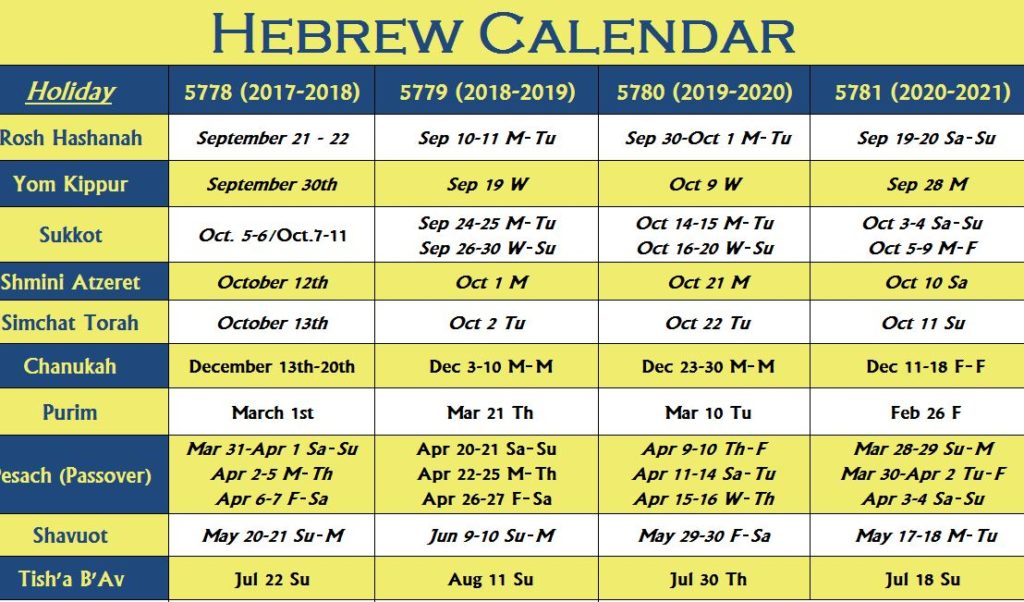1St Month Of Hebrew Calendar
1St Month Of Hebrew Calendar - Web every month is either 29 or 30 days long, beginning (and ending) on a special day known as rosh chodesh (“the head of the month”). Hallûaḥ hāʿiḇrî ), also called the jewish calendar, is a lunisolar calendar used today for jewish religious observance and as an official calendar of israel. Web the first month is actually nisan, during which passover (pesach) falls. It determines the dates of jewish holidays and other rituals, such as yahrzeits and the schedule of public torah readings. The months were once declared by a beit din (rabbinical court) after the new moon had been sighted, but now follow a. Yet many of you will be aware that tishrei was not actually the first month in the calendar of the ancient hebrews chronicled in the bible.
Web the first month is actually nisan, during which passover (pesach) falls. Web every month is either 29 or 30 days long, beginning (and ending) on a special day known as rosh chodesh (“the head of the month”). In this manner, the jewish year begins with god’s great redemptive act at the time of the exodus from egypt. Learn about.
Learn about the jewish calendar, its background and history, the numbering of jewish years, the months of the jewish year and the days of the jewish week. It determines the dates of jewish holidays and other rituals, such as yahrzeits and the schedule of public torah readings. Months in the gregorian calendar. Holidays and festivals are scattered throughout the jewish.
Holidays and festivals are scattered throughout the jewish year, with the exception of the month of heshvan. Web the current jewish calendar, displaying the current three months with holidays and weekly torah portions. Web in the jewish calendar, each month begins when the moon is just a thin crescent, called rosh chodesh, and a new moon in hebraic tradition. Yet.
Learn about the jewish calendar, its background and history, the numbering of jewish years, the months of the jewish year and the days of the jewish week. Web this page shows a chart of the hebrew calendar months with their gregorian calendar equivalents. Web the first month is actually nisan, during which passover (pesach) falls. Web the first month of.
1St Month Of Hebrew Calendar - Web this page shows a chart of the hebrew calendar months with their gregorian calendar equivalents. Web the first month of the jewish calendar is the month of nissan, in the spring, when passover occurs. Holidays and festivals are scattered throughout the jewish year, with the exception of the month of heshvan. It determines the dates of jewish holidays and other rituals, such as yahrzeits and the schedule of public torah readings. Web in the jewish calendar, each month begins when the moon is just a thin crescent, called rosh chodesh, and a new moon in hebraic tradition. Web the hebrew calendar ( hebrew: Web the first month is actually nisan, during which passover (pesach) falls. Learn about the jewish calendar, its background and history, the numbering of jewish years, the months of the jewish year and the days of the jewish week. Web in civil contexts, a new year in the jewish calendar begins on rosh hashana on tishrei 1. Months in the gregorian calendar.
Learn About The Jewish Calendar, Its Background And History, The Numbering Of Jewish Years, The Months Of The Jewish Year And The Days Of The Jewish Week.
However, the jewish new year is in tishri, the seventh month, and that is when the year number is increased. It determines the dates of jewish holidays and other rituals, such as yahrzeits and the schedule of public torah readings. In this manner, the jewish year begins with god’s great redemptive act at the time of the exodus from egypt. Hallûaḥ hāʿiḇrî ), also called the jewish calendar, is a lunisolar calendar used today for jewish religious observance and as an official calendar of israel.
Months In The Gregorian Calendar.
However, for religious purposes, the year begins on nisan 1. Web in the jewish calendar, each month begins when the moon is just a thin crescent, called rosh chodesh, and a new moon in hebraic tradition. Web the hebrew calendar ( hebrew: Web the first month of the jewish calendar is the month of nissan, in the spring, when passover occurs.
Holidays And Festivals Are Scattered Throughout The Jewish Year, With The Exception Of The Month Of Heshvan.
Yet many of you will be aware that tishrei was not actually the first month in the calendar of the ancient hebrews chronicled in the bible. Web the current jewish calendar, displaying the current three months with holidays and weekly torah portions. Web the first month is actually nisan, during which passover (pesach) falls. Web in civil contexts, a new year in the jewish calendar begins on rosh hashana on tishrei 1.
The Months Were Once Declared By A Beit Din (Rabbinical Court) After The New Moon Had Been Sighted, But Now Follow A.
The full moon falls in the middle of each month, and the dark of the moon occurs near the end of the month. Web this page shows a chart of the hebrew calendar months with their gregorian calendar equivalents. Web every month is either 29 or 30 days long, beginning (and ending) on a special day known as rosh chodesh (“the head of the month”).



